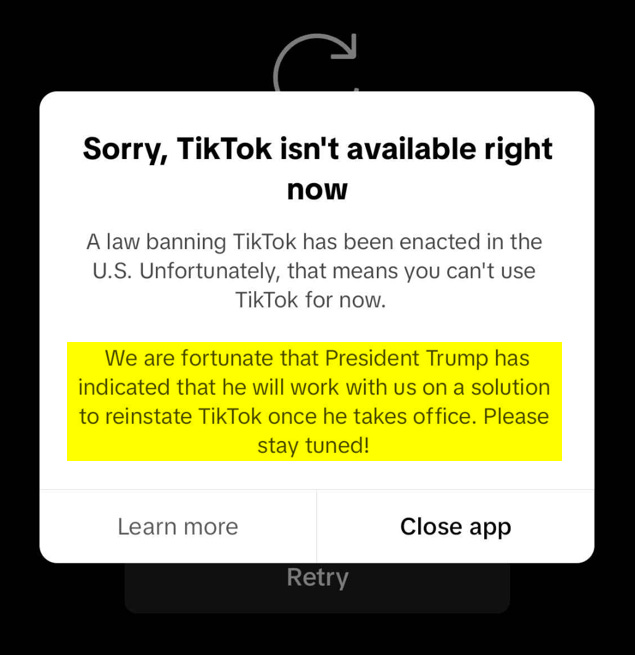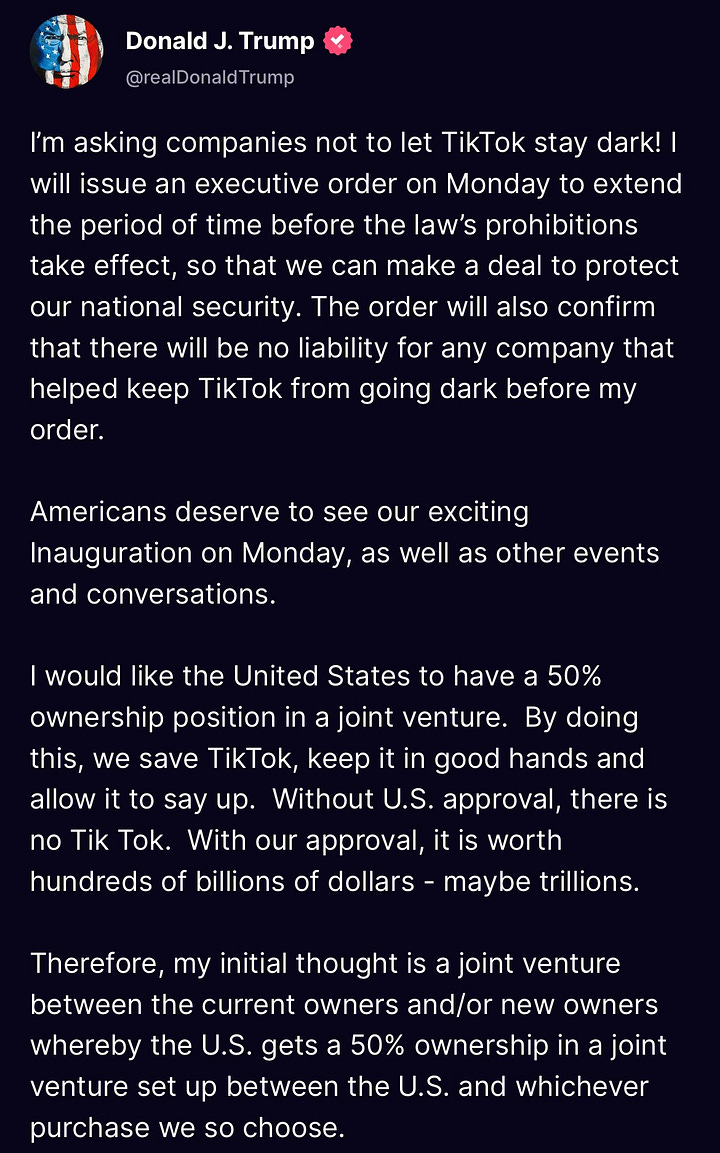The TikTok Generation: Biden’s Gift to Trump
How Democrats Handed Republicans the TikTok Generation in 36 hours
If you’re frustrated, I’m with you; if you’re not, you should be, read on…
Right now, 150 million Americans—many of them young voters who overwhelmingly lean Democrat—are staring at their phones, seeing this: “TikTok isn’t available right now... President Trump has indicated that he will work with us on a solution to reinstate TikTok once he takes office.”


Let that sink in.
Let me be clear: it gives me no joy—none whatsoever—to give Trump credit for anything. But we must face reality. Because of a strategic blunder so catastrophic it feels almost intentional, President Biden just handed Trump—on a silver platter—the chance to paint himself as the savior of TikTok and free speech. The issue isn’t that Biden signed the law; it’s that he had the opportunity to issue a 90-day extension to delay its impact—and he chose not to. By failing to act, he set the stage for the ultimate political trap. In less than 36 hours after his inauguration, Trump will almost certainly "save" TikTok by granting that same extension, and millions of Americans will thank him for it.
Who will they blame for the app going down in the first place? Democrats. And they won’t care about the context: that Republicans were the ones who initially pushed for the ban, that Trump signed two executive orders banning TikTok during his presidency, or that more Republican votes backed the law than Democrat votes. No. What they’ll remember is that Biden signed it into law, and Trump "fixed" it.
This isn’t just a tactical misstep. It’s political malpractice.
To be honest, I didn’t even plan to write about the TikTok ban. Why? Because I assumed—like any reasonable observer—that there was absolutely no way President Biden would miss the obvious and easy opportunity to issue the 90-day extension. It seemed unthinkable that the administration wouldn’t take that simple step to delay the ban, avoid a political catastrophe, and sidestep the trap Republicans had so clearly laid.
But here we are.
The Republicans’ Mastery of Repetition and Narrative Control
We need to talk about how Republicans play the political game—because they’re damn good at it. Their strategy is as simple as it is effective: repetition, framing, and narrative control.
For years, Republicans have perfected the art of hammering their messaging into the public consciousness, over and over again, until it becomes “truth.” It doesn’t matter if the facts are flimsy or outright fabricated—what matters is that their narrative dominates the conversation.
And now they have an invaluable weapon: the TikTok ban.
Young people are an incredibly important demographic—and they lean heavily Democrat. But thanks to this debacle, Republicans are about to make inroads with that very audience. Millions of young users will see Trump positioned as the guy who saved their favorite app, while Democrats are painted as the party that "took it away."
Trump and his allies will amplify this narrative relentlessly. On every platform, in every speech, they’ll hammer the same point home: "Democrats killed TikTok. Trump brought it back." Repetition. Framing. Narrative control. And you know what? It’ll work—because that’s how it always works, because that’s how politics works.
This Is Not a Mistake We Can Afford
Let me be blunt: we cannot afford this level of incompetence.
What did we achieve by allowing the ban to take effect without the 90-day extension? Absolutely nothing. Not a single tangible security benefit. Not a meaningful show of strength. Just a brief, meaningless pause that will be undone the second Trump takes office.
And what did we lose? Everything.
We alienated an entire generation of young voters. We handed Trump a tailor-made opportunity to swoop in as a hero. And we gave Republicans the perfect propaganda tool to weaponize against us.
This isn’t just about TikTok. It’s about the bigger picture: the need for Democrats to stop walking into Republican traps. The need for our leaders to recognize that strategy matters as much as substance.
The Cost of Falling for This Trap
Let’s be real: this ban was never about protecting Americans. If national security were the real concern, we’d be addressing all the other apps and platforms—many of them U.S.-based—that pose similar data privacy risks.
At the end of the article, I have the coverage from John Oliver on Last Week Tonight which is spot on in telling you all the nuance you can possibly need for this situation.
Essentially, this law selectively targeted TikTok, turning it into a political pawn in the U.S.-China rivalry. Republicans built the narrative, Democrats fell for it, and now we’re left with the fallout:
Alienating Young Voters: TikTok isn’t just an app; it’s a cultural phenomenon. For millions of young people, it’s how they connect, create, and express themselves. By taking it away, Democrats didn’t just ban an app—they alienated an entire demographic.
Handing Trump the Win: The timing of this ban is beyond absurd. By letting it take effect just days before Trump’s inauguration, we gave him the perfect opportunity to play the hero. The message to voters is clear: Democrats broke it, Trump fixed it.
Failing to See the Bigger Picture: This isn’t the first time Democrats have fallen for Republican games. From culture wars to manufactured crises, we keep letting the GOP set the narrative while we scramble to respond. It’s time to stop playing defense and start thinking strategically.
Wake Up, Democrats
If you’re a Democrat reading this, I need you to understand something: this isn’t just about Biden. It’s about all of us demanding better from our leaders. It’s about recognizing that good intentions and sound policies mean nothing if they’re undermined by bad strategy.
Some people say that Republicans are playing chess while we’re playing checkers—actually, no, this is Democrats losing at Tic-Tac-Toe as the starting player against someone who doesn’t know how to play. This was such an incredibly dumb mistake that I can hardly muster the words to describe it.
And for those trying to excuse it, let’s dismantle a couple of the counterarguments making the rounds:
“Biden said he wouldn’t enforce the ban, so there was no need for TikTok to shut down.”
This is dumb and beside the point. If Biden truly didn’t want to enforce the ban, the way to do that would have been to use the power explicitly provided to him in the law and issue the 90-day extension. That would’ve bought time and signaled clearly that the ban wouldn’t take effect under his watch. Instead, he chose to rely on a vague, non-binding statement of intent—which does nothing to prevent TikTok’s shutdown or the political fallout that followed.“The Supreme Court allowed the ban to stay, so there wasn’t much Biden could do.”
Also beside the point. The issue here isn’t whether SCOTUS carried water for the Republicans or upheld the law—that’s a given in today’s political climate. The issue is that Biden had a rare opportunity to prevent Trump from getting a massive political win despite SCOTUS’s decision. This was a chance to outmaneuver the GOP, and instead of seizing it, we threw it away.
Young voters are the future of our party—and we just gave them a reason to distrust us. If we don’t learn from this mistake, we’re not just risking the next election. We’re risking the long-term viability of our movement.
Conclusion: No Room for This Level of Incompetence
This didn’t have to happen. By enacting the 90-day extension, Biden could have avoided this entire disaster. Instead, what we got was 36 hours of TikTok downtime that achieved nothing and handed Trump and the Republicans a once-in-a-lifetime opportunity to win over a generation of young voters.
This isn’t just a mistake—it’s a catastrophic failure of strategy. And there must be consequences.
Let me say this loud and clear: anyone involved in the decision not to run the 90-day extension—every single consultant, strategist, and advisor—needs to be fired. Not just fired, but blacklisted. Forever. These people have proven beyond a shadow of a doubt that they are unfit to have any role in shaping Democratic strategy. From now until the end of time, they should never again be allowed to influence what this party does.
We’re fighting for the future of this country, and there’s no room for this level of incompetence. No room for leaders or advisors who can’t think two steps ahead. No room for people who hand Republicans political gifts this massive.
If you’re reading this, you’re not just an observer—you’re part of The American Manifesto. This isn’t just my voice—it’s our voice, calling for accountability and demanding better from the leaders who represent us. But we can’t do this alone. We need you to help spread the word. Share this article far and wide so more people understand the stakes and the urgency of getting smarter about political strategy.
And if you believe in the work we’re doing—speaking truth to power without paywalls or corporate influence—consider becoming a paid subscriber. Your support helps us continue this fight, amplifying our collective voice and ensuring that no misstep, no betrayal of the public trust, goes unchallenged.
This is our wake-up call, and it’s one we must answer together. Let’s hold our leaders accountable, demand competence, and refuse to let these kinds of mistakes happen again. The stakes are too high, and we cannot afford to lose.
Together, we can be the change.
TikTok Ban on Last Week Tonight with John Oliver
As promised, John Oliver’s coverage of the TikTok ban:





The TikTok Ban: A Psychological Power Play
Donald Trump’s handling of the TikTok ban is a textbook example of psychological manipulation targeting Gen Z. Here’s how the strategy worked:
1. Manufactured Crisis
By framing TikTok as a national security threat, Trump exploited the illusory truth effect—repeating a claim until it felt true. Targeting TikTok, a Gen Z cultural hub, triggered reactance psychology, where restrictions fuel rebellion, making his eventual reversal more impactful.
2. Perception of Power
Trump’s decision to lift the ban created the illusion he was more powerful than Congress. This leveraged the halo effect, positioning him as an independent disruptor, resonating with Gen Z’s distrust of traditional institutions.
3. Oversimplified Narratives
The ban boiled down to “Trump vs. Congress,” exploiting Gen Z’s reliance on quick, surface-level content. This relied on heuristics—mental shortcuts that simplified the issue, obscuring the deeper manipulation at play.
Takeaway for Gen Z
Trump’s TikTok manoeuvre reveals how easily emotional triggers and oversimplified narratives can be used to manipulate even the most skeptical generation. The solution? Stay critical, dig deeper, and question who benefits from the spectacle.
GQ
Agreed, the whole thing has been transparently political from the start. I do see the liability in allowing foreign nations to collect data on our citizens but TikTok is not the standout they are pretending it to be and US owned apps with bad security are just as if not more risky. It's similar to legislative issues with gun control, drugs and all sorts of other issues - to effectively regulate instead of targeting a specific item it's necessary to define the mechanism that generates the outcome which is undesired and write laws defining the use or non use. If you just ban TikTok or just ban AR-15's exc. Then someone will just dress whatever it is up differently and market the new version like has just happened with rednote and why you can go to gun shows and even mail order mods to turn legal weapons into functionaly automatic weapons exc. Because we outlawed a specific thing but not the thing that makes it the thing that was undesirable.